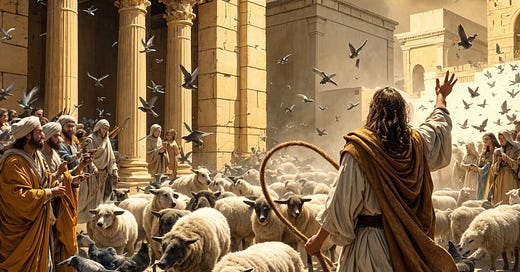From the Gospel according to John 2:13-22
Just before the Jewish Passover Jesus went up to Jerusalem, and in the Temple he found people selling cattle and sheep and pigeons, and the money changers sitting at their counters there. Making a whip out of some cord, he drove them all out of the Temple, cattle and sheep as well, scattered the money changers’ coins, knocked their tables over and said to the pigeon-sellers, ‘Take all this out of here and stop turning my Father’s house into a market.’ Then his disciples remembered the words of scripture: Zeal for your house will devour me. The Jews intervened and said, ‘What sign can you show us to justify what you have done?’ Jesus answered, ‘Destroy this sanctuary, and in three days I will raise it up.’ The Jews replied, ‘It has taken forty-six years to build this sanctuary: are you going to raise it up in three days?’ But he was speaking of the sanctuary that was his body, and when Jesus rose from the dead, his disciples remembered that he had said this, and they believed the scripture and the words he had said.
The Gospel of the Lord.
Praise to You, Lord Jesus Christ.
This passage depicts Jesus cleansing the Temple in Jerusalem by driving out the money changers and merchants who had set up shop there. Unlike the Synoptic Gospels, John places this event early in Jesus' ministry, implying it may have been the trigger that turned the religious authorities against Him.
John also provides more symbolic meaning to the Temple cleansing. By referring to the Temple as his "Father's house," Jesus affirms his divine identity as the Son of God. His disciples later understand his zeal for the Temple as a Messianic fulfilment of Psalm 69:9.
When challenged by the Jews to prove his authority, Jesus enigmatically responds that if they destroy "this temple" (referring to his physical body), he will raise it again in three days. John explicitly states that Jesus was speaking about his resurrection, and Jesus' disciples later grasped this. Overall, the Temple cleansing foreshadows Jesus' death and resurrection.
Today’s Reflection:
In this dramatic scene, Jesus expresses righteous anger at seeing greed and commerce trivializing the sacred purpose of the Temple. As the Son of God, zeal for his Father’s house consumes his heart. He forcefully overturns the money changers’ tables and drives out those exploiting others’ faith for monetary gain.
Keep reading with a 7-day free trial
Subscribe to Viktorious Living to keep reading this post and get 7 days of free access to the full post archives.



